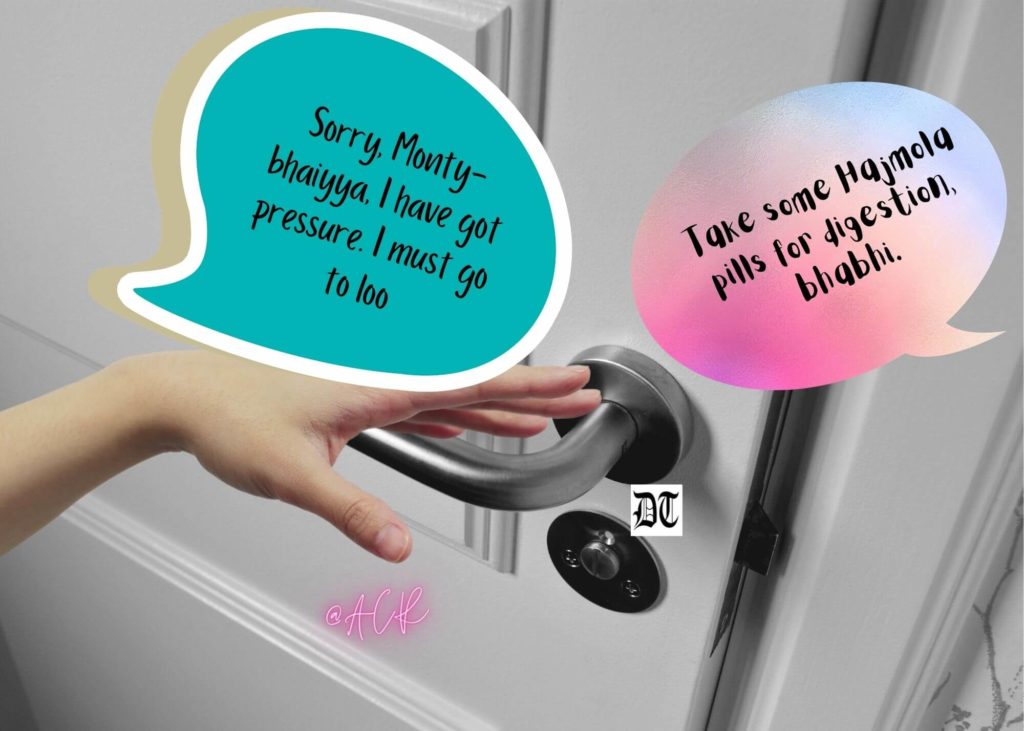Niharika depicts the lives of the Desis in the Promised Land, America. She portrays their plush lifestyle and conflicts, replete with American desi quirky humour. She creates the ambience with keen details. An exclusive for Different Truths.
“Arrey Beta, you cannot put a small girl in jail”, Raj’s beleaguered voice cut through the chaos on the fourth try. “Sure we can!” squeaked seven-year-old Bittu, glaring at his pint-sized five-year-old sister. “She has to roll a six if she wants to get out of jail,” announced my sanctimonious seven-year-old. Dimple burst into dramatic tears with much wailing and flailing of arms. She had to roll a six or else, she would “stay in jail FOREVER!”
“Raj, take care of her, pleeeease?” Rekha pleaded. The corner of my eye caught her fixing herself a discreet drink and sinking into a chair. Raj and Rekha were raised in conservative small-town India. But here, a world away in the sweltering two-bedroom apartment in Virginia, alcohol was liberating. The pursuit of freedom is an unequivocal tenet of the immigrant experience, and Rekha intended to be free.
My husband is convinced that Dimple is “already high maintenance and will be a pain in the ass when she grows up.” Dimple is like her mother, as I am like mine. We are all a pain in the ass of somebody or the other. But Rekha and Dimple expect life’s finest offerings to be showered upon them by devoted men. My mother and I are still waiting to be showered upon.
Raj plonked his drink down in exasperation. “No bloody peace in this house!”
Raj plonked his drink down in exasperation. “No bloody peace in this house!” The single malt left behind an aggressive ring of condensation on the latest Craig’s List coffee table. The table procured after belligerent haggling with Tim, a disinterested Millennial jettisoning his recently former girlfriend’s belongings. The girlfriend had scooped up the Chihuahua and the car keys and walked out in blinding fury after discovering Tim’s penchant for Internet pornography. Tim, on the other hand, had thought it best to immediately sell all her furniture to finance his porn habit.
Monty, born Maninder Singh Ahluwalia in faraway India, had arrived promptly at eight, showered, shaved and smelling like a bottle of cologne, to drive Raj 60 miles to West Virginia for only this table. Rekha was pissed. She was not a morning person. Complicated rituals had to be accomplished before she was willing to face the world. These non-negotiables began with a carefully prepared masala tea to ignite the bowel. Raj would wake up early, make the tea and serve it to her in bed, where she would sip it slowly until she was completely satisfied it had done its job. This could take five minutes. Or it could take an hour. Much to Rekha’s chagrin, Monty, a short, balding, mustachioed, pot-bellied Punjabi man who spoke in non-sequiturs, had arrived just as the tea had initiated ignition.
…Monty had arrived. He had come to America, in 1985, to work at his uncle’s gas station in Sacramento, and he now owned five of his own.
Sorry, Monty-bhaiyya, I have got pressure. I must go to loo,” Rekha announced. “Take some Hajmola pills for digestion, bhabhi.” Monty assured her jovially jangling his fancy car keys.

For all intents and purposes, Monty had arrived. He had come to America, in 1985, to work at his uncle’s gas station in Sacramento, and he now owned five of his own. Two in Jersey; one in Maryland with a significantly sized Minimart attached; one in Virginia; and one in North Carolina. Monty was a small business owner. The Republican Party had been good to him, and he responded with generous campaign donations as long as he could sneak them past his wife.
He was pushing 50 faster than 50 could push back, and he would mark his 51st birthday with a heart attack if he didn’t “shape up”, Dr. Arora had admonished.
Dr. Arora and his wife Meera were All India Institute of Medical Sciences graduates, who, like most of their “1974-batch” graduating class, had packed their bags and their two-month-old son, bid farewell to the motherland and boarded a one-way PanAm flight to JFK more than 40 years ago. He, an average student, was to major in cardiology, and she, a gold-medalist, was on track to be a neurosurgeon. The residency program at NYU had been rigorous, and life had been far from easy.
Dr. Arora had gone on to become a successful cardiologist and had established a thriving practice in a Maryland suburb, where he treated Monty.
Dr. Arora had gone on to become a successful cardiologist and had established a thriving practice in a Maryland suburb, where he treated Monty. Meera eventually became a pathologist and now oversaw “Arora and Arora’s” lab, where she spent her days running cholesterol numbers for her husband’s affluent overweight patients. Her son, Amit, had graduated cum laude from NYU and Harvard and was chief neurosurgery resident at the Mayo Clinic. Staring at hematocrits, thyroxine levels, LDL, HDL and bilirubin all day, Meera would sometimes wonder what it might have been like to pursue her dream of becoming a neurosurgeon.
“Open roads yaar! Open roads!” Monty sang in his distinctly Delhi-American accent. The non-sequiturs flew with gay abandon, as ‘Bollywood Oldies’ blared in surround sound. “Old is gold, you know? I love this car! Arrey, buckle your seatbelt! Safety first! I can’t complain. Big house, good business, money in the bank. I tell my kids; you are so lucky to live in this country. They have no clue. I miss India yaar. I miss chicken tikka!” They had stopped for tikka on the way. A Korean-owned hypermarket sold chicken tikka with pickled onions that tasted almost like those back home. Almost.
Tim had not taken kindly to the two brown men reeking offensively of kimchi, raw onions and Drakkar Noir, showing up at his door…
Tim had not taken kindly to the two brown men reeking offensively of kimchi, raw onions and Drakkar Noir, showing up at his door, telling him how this table could be had for ten rupees at any roadside bazaar in India. They had arrived an unapologetic hour late and balked at the price.
“Two hundred dollars?!” If Tim wanted to sell, they scoffed, he’d have to do better, or they’d walk. Tim had offered ideas of where they could stick their ten rupees before hauling their brown asses back to wherever the heck they came from. But really, all he wanted was six months of unrestricted access to “Girls Gone Wild.” Selling the table for a couple hundred bucks would allow him that, plus a bit left over for pizza. Two hours later, the brown asses had smugly sauntered out of Tim’s apartment with the table. “Thirty dollars is too much,” Raj had lamented. “Happy wife. Happy life”, Monty had reasoned, backing his now literally fully-loaded SUV out of Tim’s driveway.
The table now occupied pride of place in the Kumars’ eclectically appointed apartment. It’s Ethan Allen East Hampton persona in a silent tussle with a former tenant’s Ikea Ektorp couch and shag rug. Calendar portraits of Hindu deities beamed benignly down on elaborately framed photographs of the last Kumar family vacation to Miami; and McDonald’s Happy Meal toys, teddy bears and Barbie dolls jostled with Indian tchotchke on the mantle. In the foreground, a massive, big-screen TV – also a Craig’s List purchase – was streaming barely legally, The Return of the Jedi – dubbed in Hindi with English subtitles.
“Raj! Use coaster! You want to get another table for me, kya? And why is Dimple still crying?”
“Raj! Use coaster! You want to get another table for me, kya? And why is Dimple still crying?” Rekha scolded Yoda-like. Tonight, Raj had poured himself a rare Johnnie Walker Blue Label, a wedding present from 10 years ago, and Rekha was actively lobbying for Tequila shots, having just downed a beer in a coffee mug, but with a carefully segmented lime swimming in it.
Raj gingerly unfolded his gangly frame, hastily stuck a magazine under his glass. “Boys!” WHAT is the problem? What is PROBLEM? Why can’t we play together? Why is she crying? Beta, why are you STILL crying? I will take my iPad away for one week! No! Two weeks!” The indignant boys waved an angry Monopoly box in his face. “See!” they pointed to its fraying sides. “It says you have to roll a six to get out of jail. She only rolls ones. She needs to roll a six, can’t you even see?!”
“These children, you know,” Raj shook his head as my husband shot him a pained look of empathy….”

“These children, you know,” Raj shook his head as my husband shot him a pained look of empathy. Raj caught the look. “You want one?” he said, waving his glass in the air and clattering the ice cubes. “Chalo, come on man. Have a whiskey! Rekha! Get some more whiskey!” He sat back down and propped his legs up on Tim’s ex-girlfriend’s table. His whiskey glass had etched a faint but visible ring on the surface. “Not tonight”, he thought. He’d face the music tomorrow. Not tonight. He took a long slurpy draught of the amber liquid. It reminded me of the way workers back home sipped their milky sweet hot chai, before taking a languid drag from their rolled up leaf tobacco. “How are we going to teach them good Indian values in this country?” Raj lamented to no one in particular. “We come to the U.S. for a good life for children. But they just don’t listen! I don’t know what they learn in school. Too much imagination. If they keep imagining all the time, how will they learn?! Your son will be fine. He is half-American. How, you say? Indian American? He does not have a mother tongue. He can be fine in this type of system. But ask Bittu to multiply one hundred and thirty-five by two hundred and sixty-seven in his head? Nothing you will get! NOTHING!! What am I going to do?! Dimple, she is a girl. She can be serious with her studies, but Hey Bhagwaan so dark! Anyone will marry her?” He shook his head, “Poor girl! Bechaari! We made a mistake by coming to America. Too much freedom here. Rekha! Arrey, what can we do? Phooti kismat! Bad luck!
Rekha was miraculously missing from this mayhem. I encountered her silhouette on the balcony – tequila, salt and lime. She gave her long black hair a shake and took in the warm mid-Atlantic night. I thought it best to let her enjoy her immigrant experience. Rekha was seeking freedom.
The kids were quiet, watching the Star Wars movie dubbed in Hindi. “This is how they will learn language!” Raj wagged an annoyed finger at them. “Kuchh seekho! Learn something!” His quiet, weary eyes wistfully wandered to his slowly warming whiskey. The very expensive scotch on the rocks had turned into a urine sample with flecks of melting ice. What a bloody waste!
“Dimple!” He declared abruptly. “Beta, you go roll a six now and change your luck!”
Picture design Anumita Roy





 By
By
 By
By
 By
By
 By
By
A good read.
Loved the story … mix up of Deshi and videshi tadka . Keep it up great